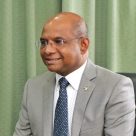
Minister of Foreign Affairs
Abdulla Shahid
Politics / Maldives
“Investing in a blue economy will push the country forward”
In a time of rapprochement between the Maldives and its Indian neighbors and Western allies, minister of foreign affairs Abdulla Shahid highlights reducing inequalities and managing sustainable economic development as the government’s main priorities.
How would you define the Maldives diplomatic affinities today?
During the previous administration, the Maldives foreign policy focus was shifted from the west to the east. What could have been a new but fruitful path for the country resulted in us finding ourselves alienated and isolated from the international community, choosing to ignore the warnings of the international community regarding threats to democracy, human rights, and good governance. We were always a country which welcomed everyone, but in recent years the country has disregarded our Western partners and even the Commonwealth, and entirely aligning its foreign policy to a dependency of one country, China. Undoubtedly, China is a very good friend of the Maldives, with immense contribution to our development. Nevertheless, we are in the Indian Ocean and the realities of the Indian Ocean should prevail. The India-Maldives and the Sri Lanka-Maldives relationship goes back millennia. Now, this translates into an India-first foreign policy position. We are committed to fostering good relations with all partners, including China, but we are conscious of those who are closest to us.
What are your main priorities?
Many islands in the Maldives don’t have fresh drinking water, and face lack of accessibility, insufficient infrastructure, and limited healthcare facilities. Reducing inequalities is a priority. We aim to bring the basic necessities such as fresh water, food security, housing and healthcare, to every inhabited island in the Maldives by the end of our mandate. The Maldives is a firm believer in multilateralism. Our sustainable development depends on international cooperation, knowledge transfer and financial assistance.
How will the ministry contribute to the country’s economic development?
The ministry has a crucial role in the development and implementation of the 2030 Sustainable Development Agenda, including investing in a blue economy that will push the country forward. This entails preventing sea pollution and developing sustainable economic activities around our biggest resource, the ocean.
For instance, our fishing industry is net-fishing free and dolphin-friendly, making it one of the most prestigious fishing industries in the world. This makes the cost of production for Maldivian canned tuna comparatively high. Since we have moved from a low-income country to a middle-income country over the last couple of decades, we have a 25 percent duty levied on our products in the European Union (EU). This is detrimental to our economy and it is my mission to make the EU leaders understand that our fishing industry needs the room to grow and should not be treated in par with the mass fishing industries that disregard sustainability.
How does environmental sustainability feature in your foreign policy action?
In February, I went to New York to address the UN Security Council on climate change. Reminding them that I sat at the same seat in 2008, all I could do was to reiterate that the issue of environmental degradation and climate change is not a conceptual, but an existential threat for the Maldives and its people. Nothing is more important for our survival.
But it is not enough to simply speak about these issues. That is why we prepared a very ambitious renewable energy program and we have set to designate one island in every atoll as well as selected reefs as protected areas by the end of the year. Certain islands and reefs have already been protected by law under these terms, meaning they will not undergo any construction development, but will remain as a common heritage for mankind.
